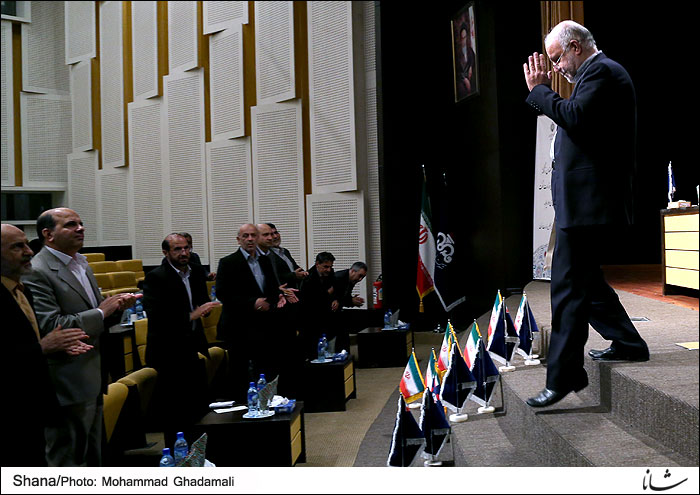“My first action will be to bring the country’s oil production capacity back to [its] 2005 [level]. To that effect, I will spare no efforts,” Zanganeh told Shana in an interview.
“Of course, I don’t mean that the production should be immediately returned to its past level because it may not be possible due to sanctions. But stable production capacity should be created so that we will be able to benefit from oil for our domestic needs under any circumstances,” he added.
Zanganeh noted that development of hydrocarbon fields Iran shares with its neighbors has to be prioritized.
He praised Iranian oil managers for their cohesion to seek a solution out of the current problems.
“I have been familiar with the petroleum industry and parliament for 30 years, but never have I seen such cohesion and solidarity between managers and MPs to get a way out of problems,” Zanganeh said.
He underscored tough sanctions imposed against Iran over its nuclear program, saying the sanctions have been slapped on the country to hamper oil production and exports.
“We have to show the enemies that colonialists should not talk to Iran with the language of sanctions,” said Zanganeh, who served as petroleum minister from 1997 to 2005. Before that, Zanganeh had served as minister of energy for nine years.
He said that he has already worked under conditions of crisis. “For example, when I became minister of energy in 1988, we used to have nine hours of blackout due to war and bombing.”
More OPEC Cooperation
Zanganeh said Iran intends to broaden its cooperation with member states of the Organization of the Petroleum Exporting Countries (OPEC).
“Under the present circumstances, we have more expectations from our OPEC friends who are mainly our neighbors,” he added.
Zanganeh described OPEC as the most influential Third World body.
He played down the OPEC secretary-general post, saying it was just an administrative position. “With this [post], a country cannot affect oil prices,” he said.
Zanganeh, however, said Iran is entitled to become the next secretary-general of OPEC.
“Iran will be following the same OEPC policy it has already defined. We work based on interaction and cooperation in order to boost the influence of this organization in the global markets,” he stated.
No Crude Sales
He referred to his achievements during his term in office in the field of oil products.
“When I joined the petroleum industry, the country’s petrochemical products were valued at one billion dollars. For the first time, development of downstream sectors started simultaneously with the oil and gas production plans,” he said.
“For example, South Pars gas field had not yet started production, but petrochemical projects came on-stream in Assaluyeh. Now, the petrochemical products are valued at more than 20 billion dollars and we are firmly determined to raise it to 40 billion dollars,” Zanganeh said.
Petrochemicals Job Creating
Zanganeh underscored Iran’s advantages for the development and production of petrochemical products, saying: “We need to make another jump in the development of this industry. To that effect, we should not limit ourselves to petrochemical products and we need to go towards construction of petrochemical parks.”
He said each petrochemical park will be able to create between 10,000 and 15,000 jobs directly.
Zanganeh said National Development Fund (NDF) and the private sector should help finance downstream oil projects, noting that the grounds need to be prepared for small-sized investments.
“I think that the government’s share of investment in the downstream oil industry needs to be minimized so that the way will be open for the private sector,” he said.
He said he was happy to see all Iranian officials and people are concerned with the development of the massive offshore South Pars gas field in southern Iran. The field is shared with Qatar.
Oil Products
Zanganeh said the necessary planning needs to be made for raising oil products production. “Before the end of the current [calendar] year [in March 2014], the country’s gasoline production should at least rise by seven million liters.”
Zanganeh also called for the acceleration of completion of treatment facilities particularly Persian Gulf Star Refinery.
Contracts
Zanganeh said he will also take steps to reform the structure of oil contracts to make them more attractive for contractors.
He noted that reformed oil contracts are required mainly for oil fields which are in the second half of their life.
“As an Iranian and a senior petroleum industry manager, I will be able to maximize national interests and let Iranian companies work together. But it does not mean that we should not interact with foreign companies... We have already done it in the country.”
Cooperation and Not Vengeance
Zanganeh said he is returning to Petroleum Ministry in order to revive this sector’s potentials.
“I extend my hand of cooperation to everyone. I have not come for take revenge,” he noted.
“I will not be able to handle the petroleum industry challenge by myself and I need the assistance of all experts,” said Zanganeh.
He noted that commodities which are consumed domestically only should not be manufactured in the country. “Any Iranian commodity needs to be manufactured in view of regional and international competition. Iran is located in the world’s energy hub.”
“Even without oil and gas, we must benefit from our geo-economic facilities,” said Zanganeh.
The former minister said huge oil reservoirs are likely to be found in Abadan desert in southwestern Iran.
“We have to devise plans for their development while we should also increase our exploration operations in the Caspian Sea.”
Oil Bourse
Zanganeh reaffirmed his support for energy commodity exchange in the country, saying stock markets always make commodities competitive.
“Few activities have been done in this sector. I will withhold no efforts for oil sale in the stock market. But it must be done by the private sector under transparent conditions and the government should not become a speculator in the market,” he said.


Your Comment